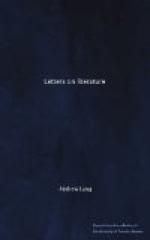Reynolds died in the enjoyment of a judicial office in the Isle of Wight, some thirty years later than his famous friend, the author of “Endymion.” “It is to be lamented,” says Lord Houghton, “that Mr. Reynolds’s own remarkable verse is not better known.” Let us try to know it a little better.
I have not succeeded in getting Reynolds’s first volume of poems, which was published before “Endymion.” It contained some Oriental melodies, and won a careless good word from Byron. The earliest work of his I can lay my hand on is “The Fancy, a Selection from the Poetical Remains of the late Peter Corcoran, of Gray’s Inn, Student at Law, with a brief memoir of his Life.” There is a motto from Wordsworth:
“Frank are the sports, the stains are fugitive.” {4}
It was the old palmy time of the Ring. Every one knows how Byron took lessons from Jackson the boxer; how Shelley had a fight at Eton in which he quoted Homer, but was licked by a smaller boy; how Christopher North whipped the professional pugilist; how Keats himself never had enough of fighting at school, and beat the butcher afterwards. His friend Reynolds, also, liked a set-to with the gloves. His imaginary character, Peter Corcoran, is a poetical lad, who becomes possessed by a passion for prize-fighting. It seems odd in a poet, but “the stains are fugitive.”
We would liefer see a young man rejoicing in his strength and improving his science, than loafing about with long hair and giving anxious thought to the colour of his necktie. It is a disinterested preference, as fighting was never my forte, any more than it was Artemus Ward’s. At school I was “more remarkable for what I suffered than for what I achieved.”
Peter Corcoran “fought nearly as soon as he could walk,” wherein he resembled Keats, and part of his character may even have been borrowed from the author of the “Ode to the Nightingale.” Peter fell in love, wrote poetry, witnessed a “mill” at the Fives-Court, and became the Laureate of the Ring. “He has made a good set-to with Eales, Tom Belcher (the monarch of the gloves!), and Turner, and it is known that he has parried the difficult and ravaging hand even of Randall himself.” “The difficult and ravaging hand”—there is a style for you!
Reynolds has himself the enthusiasm of his hero; let us remember that Homer, Virgil, and Theocritus have all described spirited rallies with admiration and good taste. From his dissipation in cider-cellars and coal-holes, this rival of Tom and Jerry wrote a sonnet that applies well enough to Reynolds’s own career:
“Were this a feather from
an eagle’s wing,
And thou, my tablet
white! a marble tile
Taken from ancient
Jove’s majestic pile—
And might I dip my feather in some
spring,
Adown Mount Ida threadlike wandering:—
And were my thoughts
brought from some starry isle
In Heaven’s
blue sea—I then might with a smile
Write down a hymn to fame, and proudly
sing!




